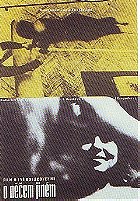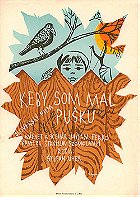This is Vera's first film after graduating from the Prague Film Academy. I was so excited to find and get it finally. Chytilova is one of female directors I worship all the time, not only for her bold and experimental mind, but also for never met the spirit of innovation, especially appreciate her early works: "Something Different" "daisy" and "Fruit of Paradise."shot in the new wave period.
"O necem jinem" is a great work, an excellent female film. No expressionism and experimentation like later "daisy", "O necem jinem" makes people feel more heartfelt female independence, initiative and attention. The film is made up of two completely unrelated stories: one records the Czech Olympic gymnastics champion Eva Bosakova in a documentary-style method, from strenuous efforts to insist on training to overcome the pain and psychological distress from the pressure, and ultimately standed in the winner of gold medal's platform; the other story describes a housewife Vera's family life in usual drama-film style. Vera's life, only had her husband and son in it, all of her busyness in every day was to take care of them. But the son was so naughty and disobedient that often makes Vera headache. and moreover, her husband was also too indifferent to have conversations with her, either slept or watched a soccer match or read the newspaper after coming home every day. Vera gradually felt intense suffocation to such a unlively life atmosphere, and her spirit had been collapsed nearly by those too much family trifles. Vera, at this time,walked out from home, met a man, began her affair.
Two story lines alternate in the film, which appears to be two completely parallel lines, no point of intersection. But right in this narrative of no intersection, the two women similarly bear their own personal living situation, then to work hard, to pursue, to protest. So strong and independent women are captured in this way by the cameras of Chytilova. At the same time, two parallel stories also look like two mirrors reflecting each other. One strived for dream, and the other was in effortful pursuit of emotion. It is very gratifying that the two women had achieved success in the end. Eva received the Olympic champion, later retired as a coach; Vera got through her pursuit and resistance to make her husband finally understand her sadness and lonelyness, the family came into jolly harmony in the end. Chytilova just simply combined documentary and narrative,the two totally different film genres in her film, and gave it a satisfactory end. In the process she brought forward new ideas and new problems, however, she did not answer it deliberately and explain her views for them, but give everything to the audience, make the audience join into the film to think about it, to get an answer for the problems.
All reviews -
Movies (2)
[Vera Chytilova|O necem jinem] Vera & Eva
 Posted : 17 years ago on 29 January 2009 01:00
(A review of Something Different (1963))
Posted : 17 years ago on 29 January 2009 01:00
(A review of Something Different (1963)) 0 comments, Reply to this entry
0 comments, Reply to this entry
[Stefan Uher|Keby som mal pusku]If i had a gun
 Posted : 17 years, 2 months ago on 25 November 2008 04:06
(A review of Keby som mal pusku)
Posted : 17 years, 2 months ago on 25 November 2008 04:06
(A review of Keby som mal pusku)Slovak Film Institute recently released a "70s Slovakia film series" DVD package, presently including 11 films. This film is the third one in the package, as I have been looking for Stefan Uher's films and fail, so I can hardly wait to watch it at first. Stefan Uher, known as one of briliant directors in the Czech New Wave, and one of his works "The Sun in a Net" is considered to be the opening chapter of the Czech New Wave. But most of his works have been buried under the ground for a long period and little-known, so very rare. I am looking for them in a long time and have not found it. "If I had a gun" it is the first one of his works i have watched.
This film is little actor Vlado's revolt inwardly in the face of war, the desire of having a gun from the very beginning of film had been lingering in the minds of Vlado, as Vlado's catapult shot was useless for wild ducks, so resulted in the laughing of his little companions, and then wild ducks were laid down by a shotgun. but the desire came true accidentally in World War II when the Germans entered into the town. The German soldiers strictly prohibited possession of guns at home, Vlado's selfish uncle hid the gun in Vlado's home and secretly paid for his safe keeping, in order to avoid trouble. Vlado is a clever and naughty 12-year-old boy, often has many interesting ideas or practical jokes, somewhat like Tom Sawyer. He and little partners discussed the Jewish circumcision, or even peeped at a woman taking a bath. Vlado also likes to show off in front of his little partners, always would like to become a hero. and what's more, he is the kind-hearted, full of righteousness.In Vlado's mind, the limit between his imagination and the real world is very vague, so from time to time his interesting imagines are insected in the film. His imagination totally reflects his beautiful desire, but cruel reality always runs in the opposite direction. He hoped to kill all of those Germans by that gun, but did not have enough courage all along. after going through those process that coming across with the Soviet Union partisan, his little sister's dead, and lame father was looked as a thief by his uncle so that nearly hanged himself, Vlado also witnessed the Germans' arbitrariness and cruel in the hometown, his young and naive heroism leaped up gradually in the heart. at last, when the Germans was fail in this war and got ready to leave, he finally chose to fire a fatal shot to German Officer which he hated most by his gun.
after the experience like dream also like verity, Vlado grew up and be more sensible to know how to take care of parents and help them to do household. As his mother said: "your father before said that the war has too bad effects for the children, but our child is better and better." the film ends with Germans' withdrawal of the failure, Czechoslovakia's celebration of victory. This is a serious but innocent tragicomedy to show the repression and evil of war in naughty children's lives, and give invaders a powerful shot in the most exciting way. what a great Works!
This film is little actor Vlado's revolt inwardly in the face of war, the desire of having a gun from the very beginning of film had been lingering in the minds of Vlado, as Vlado's catapult shot was useless for wild ducks, so resulted in the laughing of his little companions, and then wild ducks were laid down by a shotgun. but the desire came true accidentally in World War II when the Germans entered into the town. The German soldiers strictly prohibited possession of guns at home, Vlado's selfish uncle hid the gun in Vlado's home and secretly paid for his safe keeping, in order to avoid trouble. Vlado is a clever and naughty 12-year-old boy, often has many interesting ideas or practical jokes, somewhat like Tom Sawyer. He and little partners discussed the Jewish circumcision, or even peeped at a woman taking a bath. Vlado also likes to show off in front of his little partners, always would like to become a hero. and what's more, he is the kind-hearted, full of righteousness.In Vlado's mind, the limit between his imagination and the real world is very vague, so from time to time his interesting imagines are insected in the film. His imagination totally reflects his beautiful desire, but cruel reality always runs in the opposite direction. He hoped to kill all of those Germans by that gun, but did not have enough courage all along. after going through those process that coming across with the Soviet Union partisan, his little sister's dead, and lame father was looked as a thief by his uncle so that nearly hanged himself, Vlado also witnessed the Germans' arbitrariness and cruel in the hometown, his young and naive heroism leaped up gradually in the heart. at last, when the Germans was fail in this war and got ready to leave, he finally chose to fire a fatal shot to German Officer which he hated most by his gun.
after the experience like dream also like verity, Vlado grew up and be more sensible to know how to take care of parents and help them to do household. As his mother said: "your father before said that the war has too bad effects for the children, but our child is better and better." the film ends with Germans' withdrawal of the failure, Czechoslovakia's celebration of victory. This is a serious but innocent tragicomedy to show the repression and evil of war in naughty children's lives, and give invaders a powerful shot in the most exciting way. what a great Works!
 0 comments, Reply to this entry
0 comments, Reply to this entry
 Login
Login
 Home
Home 15 Lists
15 Lists 2 Reviews
2 Reviews Collections
Collections